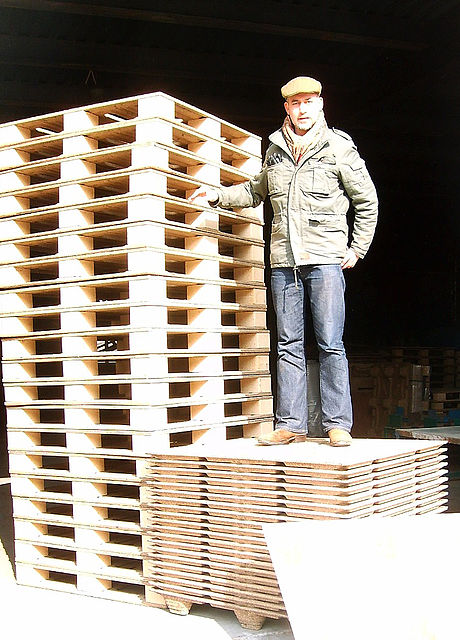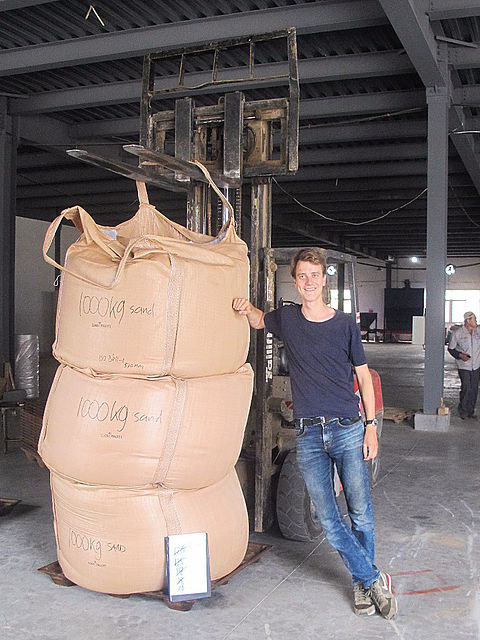- Sustainable Planet -
- 3mins -
- 4,203 views
CocoPallet: an eco-friendly alternative to wooden shipping pallets
CocoPallet is a sustainable, affordable, bio-based and biodegradable, 100% wood-free alternative to traditional export pallets — made from coconut waste!
How coconut waste can contribute to a circular economy
Every year 1.7 billion wooden pallets are being used to ship goods from Asia to the rest of the world. That means 170 million trees are cut down to make single-use, one-way export pallets for just that market alone. Most of these trees are cut down far away in places like Canada and New Zealand because there is a shortage of timber in Southeast Asia. But they do have coconuts. Millions of them. CocoPallet is a sustainable, affordable, bio-based and biodegradable, 100% wood-free alternative to traditional export pallets — and made from coconut waste!
CocoPallet: making sustainability available and affordable
Netherlands-based CocoPallet International has developed a sustainable and cost competitive Export Pallet made from Coconut Waste. CocoPallet is 100% bio-based. It replaces timber pallets and prevents logging and transportation of millions of trees.
Around 5 billion timber pallets are produced annually, causing the deforestation of 500 million trees per year.
Most of those trees are cut down far away in places like Canada and New Zealand because there is a shortage of timber in Southeast Asia.
Meanwhile, each year some 7.4 billion coconuts are harvested worldwide, and most of the value of the coconut is to be found inside. Around 85% of the unwanted hairy husk is either being burned, thrown in the ocean, or piled up to create giant biohazard.
Amsterdam-based CocoPallet set out to solve one problem with the other and developed a technique to use not only the tough fibres of the coconut husk, but also the lignin (a complex organic polymer deposited in the cell walls of many plants, making them rigid and woody), as a binder. This natural “glue” means they can produce durable products without the use of expensive and toxic synthetic resins. Alternatives such as Press Wood Pallets are expensive and not bio-based as they contain synthetic resins.
Source: CocoPallet.com

The advantages and benefits of the cocopallet make them an appealing alternative
Developed to replace wooden pallets, CocoPallet are:
- strong — standard CocoPallets can easily handle 3000Kg static load and 1500Kg dynamic load
- sustainable — made from raw materials which would otherwise go to waste
- insect-free — CocoPallet doesn’t require harmful and costly pest-treatments such as Methyl-Bromide fumigation
- export-compliant — ISPM15 compliant, can be used for transporting food and pharma
- nest-able — they fit into each other, reducing costs and lowering the carbon footprint of transportation
- CocoPallet export pallets are produced close to the Coco Husk source which creates extra income for local farmers
- CocoPallet is competitively priced — each CocoPallet is at least a dollar cheaper than the wooden varieties in current use
- Finally, at the end of the pallets’ life they can be milled down into mulch and used as an alternative to peat — ‘coco’ is a known high-quality natural soil improver.
CEO Michiel Vos says the operation scalable and CocoPallet are poised to ramp up production to meet demand as word spreads.
A cooperation between European and Asian countries, CocoPallet buys the waste husks directly from the coconut farmers, and uses only the existing local transport infrastructure, creating value at the very beginning of the chain.
CocoPallet International say they are dedicated to creating a sustainable product that is price-competitive whilst ensuring must-have features like mechanical strength and compliance. E.g. a natural binder is used instead of an expensive synthetic resin. Also, CocoPallet International developed a proprietary manufacturing process that ensures a cost competitive production of compliant pallets in substantial quantities.
Source: CocoPallet.com


